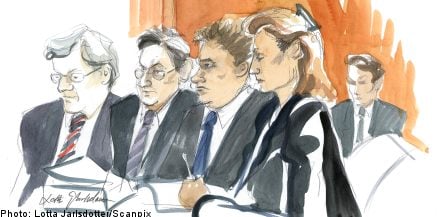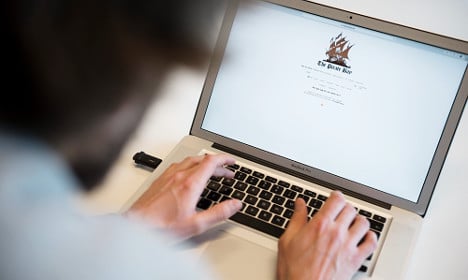Before testimony began, however, further adjustments were made by prosecutors to the language in the indictment.
A sentence reading, “All components are necessary for users of the service are able to share files with one another” was struck completely from the description of the crimes.
In addition, the phrase “provide the ability to others to upload torrent files to the service” was changed to “provide the ability to others to upload and store torrent files to the service”.
The day’s first witness was Magnus Mårtensson, a lawyer with the Swedish chapter of the entertainment industry association IFPI.
Mårtensson explained that his job was to test different file sharing services.
He described for the court how he downloaded various copyright protected material using The Pirate Bay.
“I decided on an artist, searched for it using the The Pirate Bay’s search engine, and then got a list of results,” he said.
“I then chose a file I thought was interesting, clicked on the link and then moved to a downloading page for the actual torrent file. There you can read a little information about the file.”
Mårtensson went on to explain that on the downloading page he clicked on a link called “download this torrent” allowing him to download the file, which in this case was an album by British pop-star Robbie Williams entitled Intensive Care.
“I could listen to all the songs. The quality was good,” said Mårtensson.
Following Mårtensson’s account, Fredrik Neij’s attorney Jonas Nilsson began questioning Mårtensson’s expertise.
“I’m a normal user, not some expert,” replied the IFPI lawyer, prompting one of the defendants, Gottfrid Svartholm Warg to challenge Mårtensson further as to how he could be sure that The Pirate Bay’s trackers were used during the download.
“I think I’ve said this three times, that I just assumed it,” replied Mårtensson.
Mårtensson later admitted that he had downloaded a bit torrent client from a site other than The Pirate Bay, at which point attorney Per E. Samuelson, who represents Carl Lundström, asked whether the actual file sharing was performed by the client.
“I can’t answer that,” he said.
Samuelson continued to press Mårtensson on whether one can download files using Google.
“I’ve never done it using Google. I can’t answer that,” said Mårtensson.
“But you’ve worked for IFPI for 15 years, you ought to know that, right?” countered Samuelson.
“You’re not going to get me to answer that. I haven’t done it on Google.”
“Is that your answer to me, that you’ve worked for IFPI for 15 years and aren’t aware that there are other bit torrent sites?”
“Obviously I know there are other sites, but I don’t know about Google. You have to accept that,” said Mårtensson.
Following further questioning, the IFPI lawyer admitted that when the downloading took place he was not on The Pirate Bay website, but in the file sharing programme itself.
Samuelson also wondered why Mårtensson hadn’t tried to contact the uploader of the torrent file or locate other users who had downloaded the album.
Next on the stand came Anders Nilsson of Sweden’s Antipiratbyrån, a Swedish agency set up in 2004 to combat the piracy of copyrighted material.
Nilsson explained how he was tasked with downloading both Swedish and American films on The Pirate Bay.
While downloading, Nilsson employed a logging programme which traced all of the data traffic to and from his computer.
He said he would click on a link on The Pirate Bay, save it to his computer, and then start his bit torrent client.
“File sharing starts when I open my bit torrent programme,” said Nilsson.
According to Nilsson’s logs, every file except for one was downloaded using a tracker from The Pirate Bay.
Nilsson was then questioned about the assumption held by his agency, the prosecution, and record companies that most of the material on The Pirate Bay is copyright protected.
Neij’s attorney Jonas Nilsson asked whether the Antipiratbyrån made its assessment based on The Pirate Bay’s “Top 100” list, to which the agency’s lawyer said that he came to the conclusion after clicking around the site, but that he didn’t document his findings.
Samuelson then asked Nilsson if he had looked into a section on The Pirate Bay’s website labeled “Other”.
According to Samuelson, most of the site’s non-copyright protected material can be found there.
Nilsson said he had not looked into that part of The Pirate Bay.
“So you’ve made selections which suit Antipiratbyrån,” Samuelson responded.
Nilsson once again said that he used The Pirate Bay’s tracker to connect his computer with other IP-addresses in order to download the films.
The evidence can be found in his data log, he said, although the records aren’t included in the case’s preliminary investigation material.
Samuelson then stated that the defendants in the case assert that it’s not possible to prove that The Pirate Bay’s tracker was the one used for the downloading.
To support the claim, Samuelson presented technical terms from the bit torrent client which show that the client searched for files outside of The Pirate Bay.
Nilsson finally admitted that he couldn’t be sure that the entire file is downloaded via The Pirate Bay tracker.



 Please whitelist us to continue reading.
Please whitelist us to continue reading.